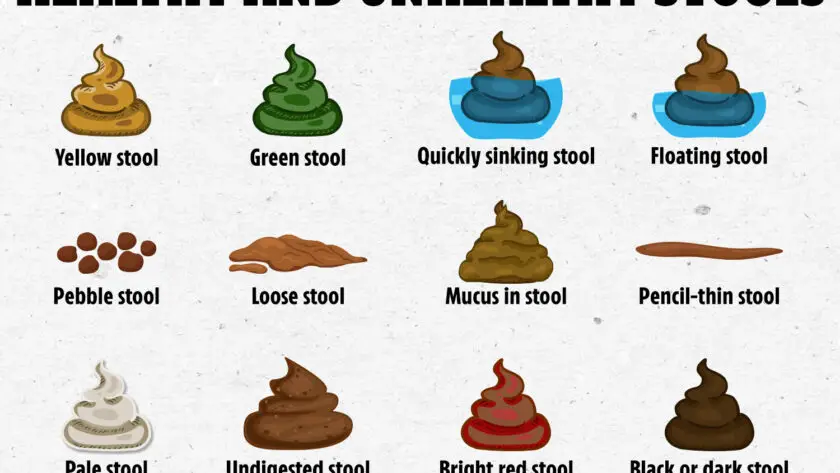Our body’s digestive system is a remarkable mechanism that extracts nutrients from the food we consume, but it also provides valuable insights into our overall health. One of the most revealing indicators of digestive and gut health is the appearance of our stool. By understanding the significance of its shape, size, and color, we can gain valuable information about our well-being. In this article, we will explore the characteristics of healthy and unhealthy stool, helping you decode the clues your body provides.
Shape of Healthy Stool
The shape of your stool can tell a lot about the efficiency of your digestive system. Here are the key aspects to consider:
- Healthy Shape: Ideally, healthy stool should resemble a smooth, elongated log or a sausage-like shape. It should be well-formed and easy to pass.
- Unhealthy Shapes: a. Hard and Lumpy: This may indicate constipation, inadequate hydration, or a lack of fiber in the diet. b. Loose and Watery: Loose or watery stool may be a sign of diarrhea, bacterial or viral infections, food intolerance, or malabsorption issues.
Size of Healthy Stool
The size of your stool reflects the amount of waste material your body is eliminating. Here’s what you need to know:
- Healthy Size: A healthy stool should have a moderate size, neither excessively large nor small. It should be proportional to the amount of food consumed.
- Unhealthy Sizes: a. Small and Pellet-like: Small, pellet-shaped stools may indicate inadequate fiber intake, dehydration, or a sluggish bowel movement. b. Large and Bulky: Oversized, bulky stools can suggest a high-fiber diet, but they may also indicate a problem with digestion or absorption.
Color of Healthy Stool
The color of your stool can provide valuable insights into various aspects of your health. Here’s what different colors may indicate:
- Healthy Color: The ideal color of stool is medium to dark brown, resembling the color of milk chocolate. This indicates a healthy balance of bile and bilirubin in the body.
- Unhealthy Colors: a. Pale or Clay-colored: Pale or clay-colored stool may signify a lack of bile, potentially caused by liver or gallbladder issues. b. Black: Black stool can indicate bleeding in the upper digestive tract, possibly originating from the stomach or small intestine. c. Green: Green stool can be a result of rapid transit time through the intestines, bile imbalances, or consumption of certain foods. d. Yellow: Yellow stool can indicate excess fat in the stool, which may be a sign of malabsorption or liver problems.
Maintaining a healthy digestive system is crucial for overall well-being, and sometimes we may need a little help in that department. Nature has provided us with various herbs and plants that can support healthy bowel movements. Among these, Sangre de Grado, Una de Gato (Cat’s Claw), Lemongrass, and Clove stand out as powerful remedies for promoting optimal digestive function. Let’s explore how these natural ingredients can aid in healthy bowel movements:
- Sangre de Grado (Dragon’s Blood): Sangre de Grado is a resin extracted from the Croton lechleri tree, native to the Amazon rainforest. This resin has been traditionally used for its healing properties, including its ability to support digestive health. It contains compounds that possess anti-inflammatory and antimicrobial properties, helping to soothe the digestive tract and reduce inflammation. By promoting a healthy gut environment, Sangre de Grado can help alleviate constipation and support regular bowel movements.
- Una de Gato (Cat’s Claw): Una de Gato, also known as Cat’s Claw, is a woody vine native to the Amazon rainforest. It has been used for centuries in traditional medicine for its immune-boosting and anti-inflammatory properties. In terms of digestive health, Cat’s Claw can help regulate bowel movements by reducing inflammation in the gastrointestinal tract and promoting proper digestion. It may also have antimicrobial properties that can support a healthy balance of gut flora.
- Lemongrass: Lemongrass is a popular herb known for its refreshing aroma and citrusy flavor. It contains compounds such as citral, which has antimicrobial and anti-inflammatory properties. Lemongrass can aid in digestion by stimulating the digestive system, reducing bloating, and relieving constipation. Its natural diuretic properties may also help flush out toxins and promote regularity.
- Clove: Clove, derived from the flower buds of the Syzygium aromaticum tree, has long been used in traditional medicine for its digestive benefits. It contains eugenol, a compound known for its antimicrobial and analgesic properties. Clove can help improve digestion, alleviate bloating and gas, and relieve constipation. It also stimulates the production of digestive enzymes, promoting optimal nutrient absorption.
While Sangre de Grado, Una de Gato, Lemongrass, and Clove offer potential benefits for healthy bowel movements, it is important to note that individual experiences may vary. It is advisable to consult a healthcare professional or a qualified herbalist before incorporating these herbs into your routine, especially if you have any underlying health conditions or are taking medications. Additionally, these herbs should be used in moderation and as part of a balanced diet and healthy lifestyle.
Incorporating natural remedies like Sangre de Grado, Una de Gato, Lemongrass, and Clove can provide gentle support for a healthy digestive system, promoting regular bowel movements and overall well-being. All of these are included in the Radiate 21 formula, which you can learn more about by visiting Radiate21.com. Use the discount code: radiate10 to get 10% off your order for a limited time!

Conclusion: Your body provides you with valuable clues about your digestive and gut health through the appearance of your stool. By paying attention to the shape, size, and color of your poop, you can gain insights into possible digestive issues, nutrient absorption, and overall well-being. Remember that variations in stool appearance can be normal due to dietary changes or temporary conditions. However, if you notice persistent changes or experience discomfort, it is advisable to consult a healthcare professional. By understanding the language of your poop, you can take proactive steps to maintain optimal digestive and gut health.





